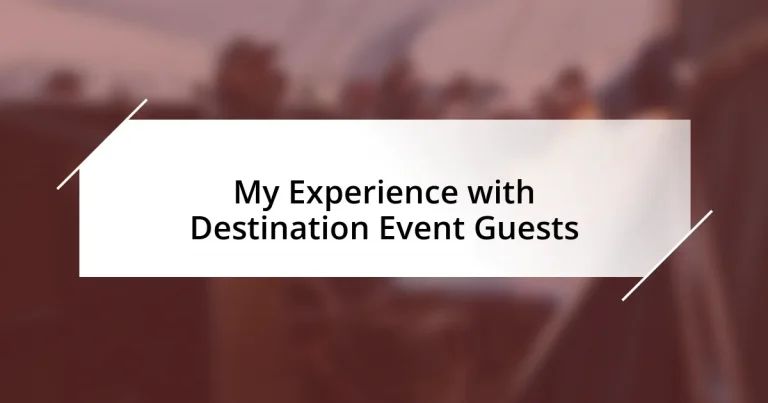Key takeaways:
- Destination events provide unique experiences by enhancing intimacy and fostering adventure among guests, creating lasting memories.
- Identifying ideal guests involves shared interests, demographic alignment, openness to adventure, and networking potential.
- Planning for diverse guest needs, including dietary preferences and accessibility, fosters an inclusive environment.
- Engaging guests before the event builds anticipation and community, while gathering post-event feedback helps improve future experiences.

Understanding Destination Events
Destination events are unique because they take place in locations that are often chosen for their natural beauty, cultural significance, or exclusivity. I remember attending a wedding on a remote beach in Mexico that captivated everyone with its stunning sunset backdrop. Isn’t it amazing how the setting itself can elevate the experience and create lasting memories?
From my perspective, one of the key aspects of destination events is the sense of adventure they provide to guests. I once attended a conference in a historic city, and the excitement of exploring new sights before and after the event truly enhanced my overall experience. Can you imagine sharing stories of a shared journey with people who, just like you, stepped outside their comfort zones?
Additionally, destination events foster a sense of intimacy and connection among guests. When I participated in a retreat in the mountains, the physical distance from everyday life created a space for openness and deeper conversations. Do you think the environment can influence the way relationships form? I’ve certainly found that being in a unique location helps to break down barriers and encourages authentic interactions.

Identifying Ideal Event Guests
Identifying the ideal guests for a destination event involves a nuanced understanding of the audience you wish to attract. I’ve found that it’s not just about the individuals’ professional credentials, but also about their enthusiasm for the destination itself. For instance, when I organized a small gathering in a vineyard, I carefully chose guests who shared a passion for wine and nature. That alignment made all the difference in creating a vibrant atmosphere throughout the event.
Here are some key characteristics to consider when identifying your ideal event guests:
- Shared Interests: Look for guests who are genuinely interested in the event’s theme or focus.
- Demographic Alignment: Ensure that attendees fit the desired age, profession, and lifestyle profiles that match your event’s objectives.
- Openness to Adventure: Seek out individuals who enjoy exploring new places and experiences, as this adds to the overall vibe.
- Network Potential: Identify guests who can contribute to valuable networking opportunities while also benefiting from connections with others.
- Past Engagement: Consider those who have previously attended similar events, as their continued interest often signifies a strong fit.
When I invited a diverse group of professionals to a team-building retreat in the mountains, the varied backgrounds fostered enriching conversations. The synergy among guests who were eager to embrace the environment can elevate the overall experience. It’s about crafting an experience that resonates with each individual while nurturing a collective spirit.
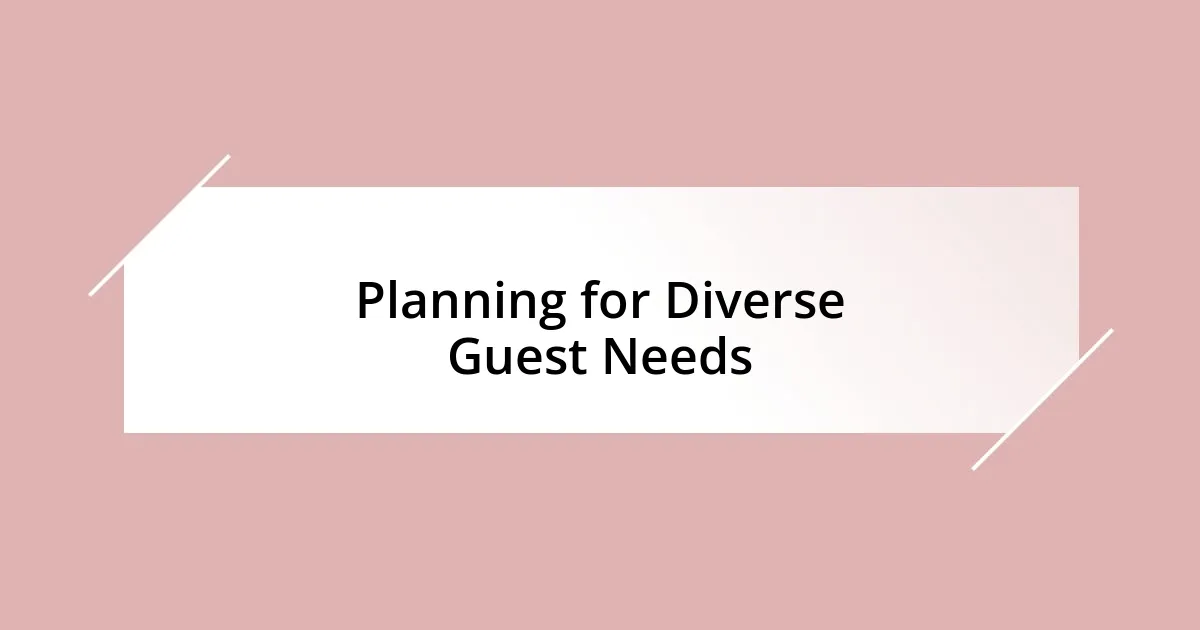
Planning for Diverse Guest Needs
When planning for diverse guest needs, I’ve learned that it’s essential to consider varied preferences and backgrounds. For instance, when organizing a retreat in the mountains, I had guests with different dietary restrictions. I remember the sense of relief on their faces when I ensured that options were not only available but delicious. Addressing these needs creates an inclusive environment where everyone feels welcome and valued.
I’ve also discovered that accessibility is a crucial factor in event planning. During a beach wedding I attended, one of the guests had mobility challenges. The venue provided ramps and seating arrangements that accommodated everyone, which made a significant impact on their experience. Hasn’t it been heartwarming to see how simple adjustments can enhance comfort for all attendees?
Moreover, cultural considerations play a vital role in shaping the event experience. At one destination conference, I noticed the diversity in the guests’ cultural backgrounds, which led to rich discussions and learning opportunities. It struck me how catering to different traditions—like using music representative of various cultures or allowing for multi-lingual materials—can deepen interactions and connections. I’ve often thought to myself that embracing our differences truly enriches our collective journey.
| Guest Needs | Considerations |
|---|---|
| Dietary Preferences | Offer diverse, delicious options for all, including vegetarian, vegan, and gluten-free. |
| Accessibility | Ensure the venue has proper accommodations for guests with mobility challenges. |
| Cultural Sensitivity | Incorporate elements that reflect the diverse backgrounds of attendees; music, food, and materials should cater to all. |

Creating Memorable Guest Experiences
Creating memorable guest experiences is all about the little moments that leave a lasting impression. I once hosted a themed dinner in a rustic barn, where the decor included personal touches that reflected each guest’s interests, like framed photos of their hobbies. It was incredible to see their expressions light up as they discovered these thoughtful details. I believe that when guests feel seen and appreciated, they form a deeper connection to the event.
One of my favorite experiences was a team-building weekend centered around adventure sports. Imagine the thrill of zip-lining through the treetops followed by cozy campfire discussions. The adrenaline kicked in, and so did the camaraderie. Seeing guests share stories and laughter while roasting marshmallows brought home the idea that shared experiences are the bedrock of unforgettable memories. What’s better than bonding over new challenges faced together?
In my experience, anticipating surprise elements can elevate the guest experience dramatically. I once arranged for a local musician to surprise our guests at a seemingly casual outdoor gathering. The moment they started playing, everyone transformed from mere attendees to engaged participants. That spontaneous burst of joy was contagious; laughter mingled with the music, and I realized that unexpected delights often create the most cherished memories. Have you ever wondered how a single moment can pivot the entire atmosphere of an event? It’s truly magical.
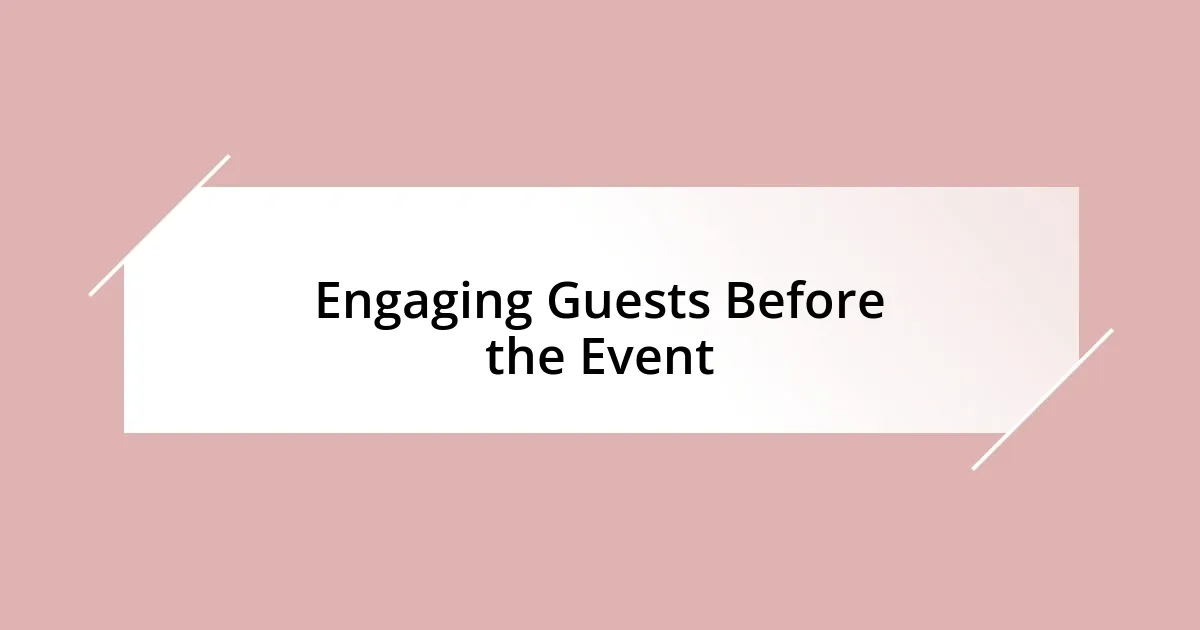
Engaging Guests Before the Event
Engaging guests before the event can set the stage for a wonderful experience. I remember once sending out personalized invitations that included a fun quiz related to the event theme. It sparked excitement and anticipation, and the replies I received were just as enthusiastic. It felt rewarding to see how a little creativity could make guests feel involved even before the event started.
I’ve often found that creating exclusive online spaces for guests generates buzz and conversations. For one destination wedding, we established a Facebook group where guests could share travel tips, discuss outfits, and even coordinate carpools. The interactions made everyone feel connected from the get-go, enhancing their emotional investment in the upcoming celebration. But have you ever considered how building this sense of community early on can transform the overall event vibe?
Moreover, I believe sneak peeks can be incredibly effective in generating excitement. For a corporate retreat I organized, we shared behind-the-scenes photos of the venue setup. Seeing the breathtaking views and engaging activities in advance cranked the anticipation level up a notch. It amazed me how simply hinting at what was to come could energize the guests and foster conversations that continued right through the day of the event. Isn’t it fascinating how anticipation can travel hand-in-hand with excitement?
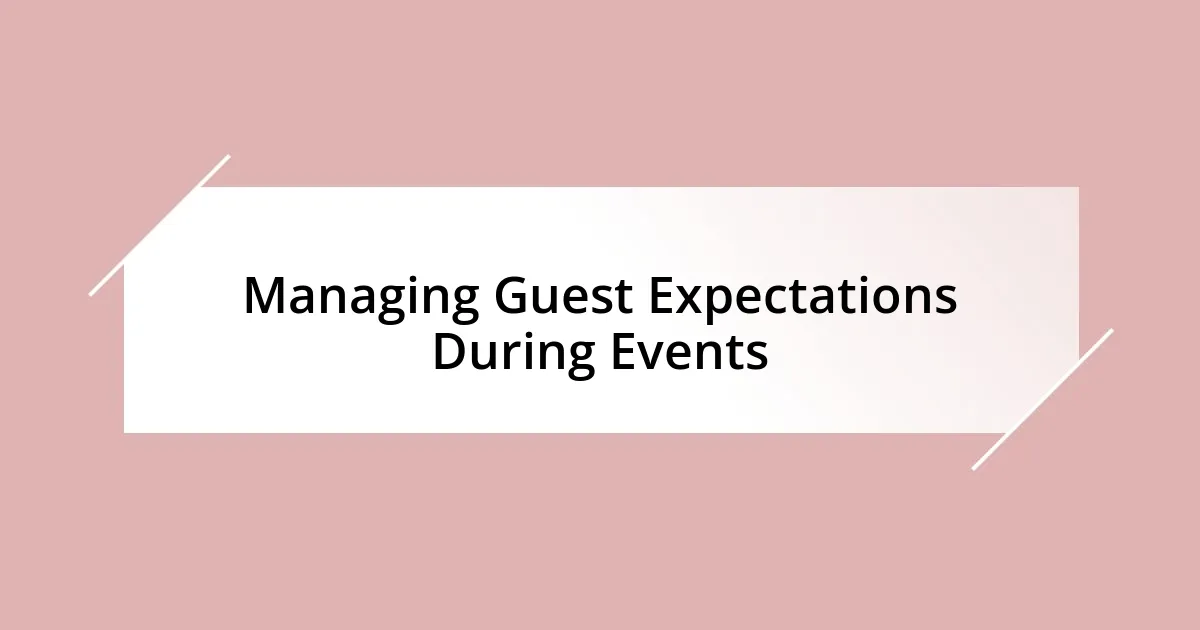
Managing Guest Expectations During Events
Managing guest expectations during events is crucial to ensuring everyone has a positive experience. I learned this firsthand when I organized a weekend retreat and realized the importance of communicating what guests could expect. I sent out detailed itineraries outlining each activity, which not only kept guests informed but also sparked curiosity about what was to come. How often do we assume guests know what to anticipate, only to find confusion when plans change?
One memorable lesson came from a high-profile gala I coordinated. We had planned an elaborate meal, but dietary restrictions emerged at the last minute. By proactively reaching out to guests prior to the event to inquire about their preferences, I was able to avert a potential misstep. Guests truly appreciated the transparency, expressing their gratitude for the attention to detail—this kind of thoughtfulness fosters trust and allows for more genuine enjoyment throughout the event.
In my view, setting realistic expectations can also enhance overall satisfaction. During a business conference I attended, the speaker’s engaging presentation style was an unexpected highlight, which significantly uplifted the atmosphere. I knew attendees were initially skeptical about the agenda, but the positive energy that emerged completely shifted their perceptions. Isn’t it interesting how the right attitude showcased in unexpected ways can bridge the gap between anticipation and reality?
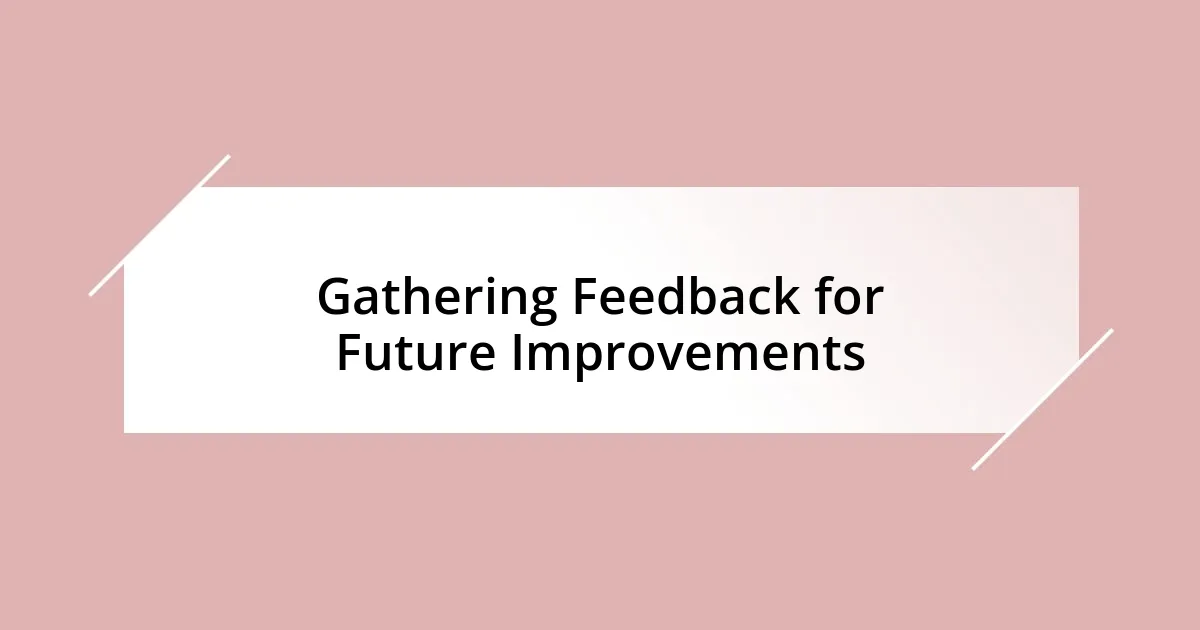
Gathering Feedback for Future Improvements
Gathering feedback after an event is an invaluable step toward enhancing future experiences. I remember hosting a destination retreat where, instead of traditional surveys, I opted for informal feedback sessions. We gathered around a cozy fire pit, sharing stories and suggestions over drinks. The relaxed atmosphere encouraged honest opinions, and I received insights that wouldn’t have surfaced in a formal setting. Have you ever realized how casual conversations can unveil hidden gems of feedback?
Another approach I found effective was using digital tools for post-event surveys. After a particularly vibrant wedding, I sent out a quick online form, inviting guests to share their experiences. While the responses varied, I was especially moved by one attendee who recalled how the personalized touches made them feel truly special. Such insights capture the heart of what we strive for: creating memorable moments. Isn’t it remarkable to see how simple questions can deepen our understanding of guest satisfaction?
Finally, I’ve learned that embracing feedback, especially constructive criticism, can be a game changer. After organizing a festival, I encountered a few remarks about the food options. Rather than feeling defensive, I took those critiques to heart and collaborated with local vendors for the next event. The shift not only improved the menu but also strengthened community ties. Isn’t it fascinating how responding to feedback can not only elevate our events but also enhance the relationships we foster along the way?












